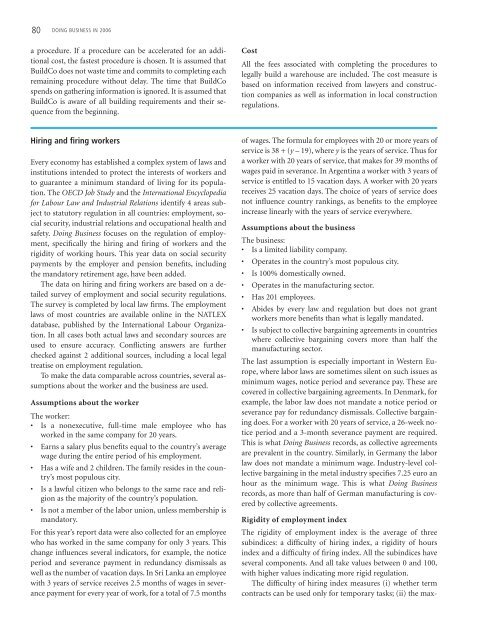Creating
Doing Business in 2006 -- Creating Jobs - Caribbean Elections
Doing Business in 2006 -- Creating Jobs - Caribbean Elections
Create successful ePaper yourself
Turn your PDF publications into a flip-book with our unique Google optimized e-Paper software.
80 DOING BUSINESS IN 2006<br />
a procedure. If a procedure can be accelerated for an additional<br />
cost, the fastest procedure is chosen. It is assumed that<br />
BuildCo does not waste time and commits to completing each<br />
remaining procedure without delay. The time that BuildCo<br />
spends on gathering information is ignored. It is assumed that<br />
BuildCo is aware of all building requirements and their sequence<br />
from the beginning.<br />
Cost<br />
All the fees associated with completing the procedures to<br />
legally build a warehouse are included. The cost measure is<br />
based on information received from lawyers and construction<br />
companies as well as information in local construction<br />
regulations.<br />
Hiring and firing workers<br />
Every economy has established a complex system of laws and<br />
institutions intended to protect the interests of workers and<br />
to guarantee a minimum standard of living for its population.<br />
The OECD Job Study and the International Encyclopedia<br />
for Labour Law and Industrial Relations identify 4 areas subject<br />
to statutory regulation in all countries: employment, social<br />
security, industrial relations and occupational health and<br />
safety. Doing Business focuses on the regulation of employment,<br />
specifically the hiring and firing of workers and the<br />
rigidity of working hours. This year data on social security<br />
payments by the employer and pension benefits, including<br />
the mandatory retirement age, have been added.<br />
The data on hiring and firing workers are based on a detailed<br />
survey of employment and social security regulations.<br />
The survey is completed by local law firms. The employment<br />
laws of most countries are available online in the NATLEX<br />
database, published by the International Labour Organization.<br />
In all cases both actual laws and secondary sources are<br />
used to ensure accuracy. Conflicting answers are further<br />
checked against 2 additional sources, including a local legal<br />
treatise on employment regulation.<br />
To make the data comparable across countries, several assumptions<br />
about the worker and the business are used.<br />
Assumptions about the worker<br />
The worker:<br />
• Is a nonexecutive, full-time male employee who has<br />
worked in the same company for 20 years.<br />
• Earns a salary plus benefits equal to the country’s average<br />
wage during the entire period of his employment.<br />
• Has a wife and 2 children. The family resides in the country’s<br />
most populous city.<br />
• Is a lawful citizen who belongs to the same race and religion<br />
as the majority of the country’s population.<br />
• Is not a member of the labor union, unless membership is<br />
mandatory.<br />
For this year’s report data were also collected for an employee<br />
who has worked in the same company for only 3 years. This<br />
change influences several indicators, for example, the notice<br />
period and severance payment in redundancy dismissals as<br />
well as the number of vacation days. In Sri Lanka an employee<br />
with 3 years of service receives 2.5 months of wages in severance<br />
payment for every year of work, for a total of 7.5 months<br />
of wages. The formula for employees with 20 or more years of<br />
service is 38 + (y – 19), where y is the years of service. Thus for<br />
a worker with 20 years of service, that makes for 39 months of<br />
wages paid in severance. In Argentina a worker with 3 years of<br />
service is entitled to 15 vacation days. A worker with 20 years<br />
receives 25 vacation days. The choice of years of service does<br />
not influence country rankings, as benefits to the employee<br />
increase linearly with the years of service everywhere.<br />
Assumptions about the business<br />
The business:<br />
• Is a limited liability company.<br />
• Operates in the country’s most populous city.<br />
• Is 100% domestically owned.<br />
• Operates in the manufacturing sector.<br />
• Has 201 employees.<br />
• Abides by every law and regulation but does not grant<br />
workers more benefits than what is legally mandated.<br />
• Is subject to collective bargaining agreements in countries<br />
where collective bargaining covers more than half the<br />
manufacturing sector.<br />
The last assumption is especially important in Western Europe,<br />
where labor laws are sometimes silent on such issues as<br />
minimum wages, notice period and severance pay. These are<br />
covered in collective bargaining agreements. In Denmark, for<br />
example, the labor law does not mandate a notice period or<br />
severance pay for redundancy dismissals. Collective bargaining<br />
does. For a worker with 20 years of service, a 26-week notice<br />
period and a 3-month severance payment are required.<br />
This is what Doing Business records, as collective agreements<br />
are prevalent in the country. Similarly, in Germany the labor<br />
law does not mandate a minimum wage. Industry-level collective<br />
bargaining in the metal industry specifies 7.25 euro an<br />
hour as the minimum wage. This is what Doing Business<br />
records, as more than half of German manufacturing is covered<br />
by collective agreements.<br />
Rigidity of employment index<br />
The rigidity of employment index is the average of three<br />
subindices: a difficulty of hiring index, a rigidity of hours<br />
index and a difficulty of firing index. All the subindices have<br />
several components. And all take values between 0 and 100,<br />
with higher values indicating more rigid regulation.<br />
The difficulty of hiring index measures (i) whether term<br />
contracts can be used only for temporary tasks; (ii) the max-

















